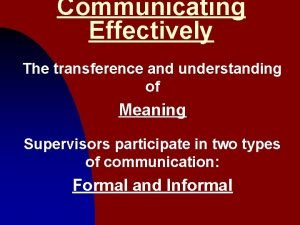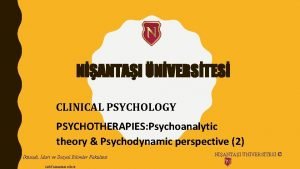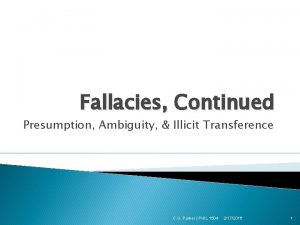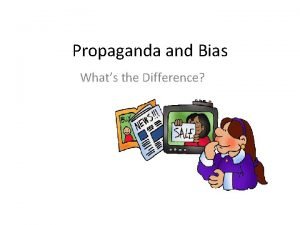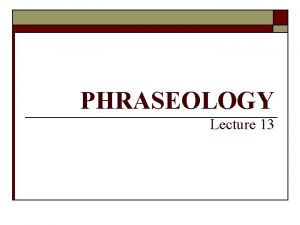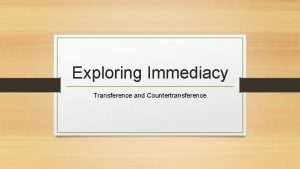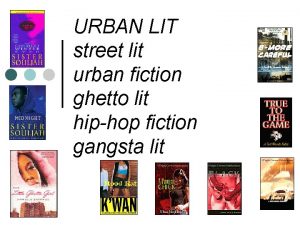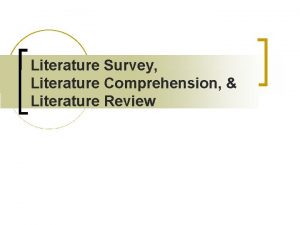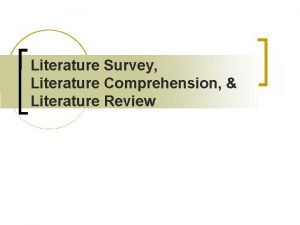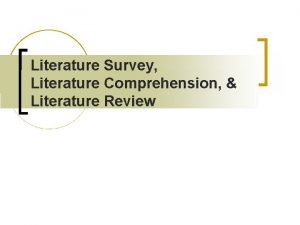C Lit 250 World Literature Transition Transference and



![Course Literary Texts • Selected poems of From Unincorporated Territory [hacha] and From Unincorporated Course Literary Texts • Selected poems of From Unincorporated Territory [hacha] and From Unincorporated](https://slidetodoc.com/presentation_image_h2/1de219c37f50d272f673d3cb011f4480/image-4.jpg)




- Slides: 8

C Lit 250 -World Literature: Transition, Transference, and Transportation -By Aaron Ero-Jones

Course Theme • In an increasingly globalized world, boundaries of nationhood, culture, and self-identification are reimagined in new and complex ways. From these new formations and epistemologies of “World, ” an increasingly globalized literary methodology is taking shape. This course will seek to dissect, define, and analyze what constitutes a World literature through physical and epistemic transference and transition of human bodies and modes of being from a myriad of cultural frameworks.

Course Theoretical Texts • “Introduction: World Literature in Theory and Practice”-David Damrosch • Introduction and Chapter 3, “Pictographic, Woven, Carved” in Trans. Indigenous: Methodologies for Global Native Literary Studies-Chad Allen • “Genre as Knowledge”-Wai Chee Dimock • Introduction to Deep Waters: The Textual Continuum in American Indian Literature-Chris Teuton • Chinook, Polynesian, and Pacific Northwest First Nations Oral Tradition Stories
![Course Literary Texts Selected poems of From Unincorporated Territory hacha and From Unincorporated Course Literary Texts • Selected poems of From Unincorporated Territory [hacha] and From Unincorporated](https://slidetodoc.com/presentation_image_h2/1de219c37f50d272f673d3cb011f4480/image-4.jpg)
Course Literary Texts • Selected poems of From Unincorporated Territory [hacha] and From Unincorporated Territory [lukao]-Craig Santos Perez (With translation from www. chamoru. info) • Homegoing-Yaa Gyasi • Chinook Tamanawas Carvings-Greg Robinson and Maori Carvings from Marae • “Hayash K’ak’a (Raven) Steals the Light”-Pacific Northwest First Nations Myth, Maui Stories-Polynesian Myths, and “Salmon Creating the Plants for the People”-Chinook Myth • Under the Skin-Johnathan Glazer • “Lost in Space” from Take Us to Your Chief and Other Stories-Drew Hayden Taylor • The Martian Chronicles-Ray Bradbury

Course Structure • The course will be sectioned into three distinct sections: Across Literatures, Across Space, and Across Body. • Across Literatures will work as theoretical framework for the course. As a class, we devote the first two weeks of the course to theoretical frameworks that attempt to define and engage with World literature. However, I will limit a frontloaded course, compared to others, in order to spend more time with the literature, itself. The first week will be reading Chad Allen’s Trans-Indigenous in conversation with David Damrosch’s “Introduction: World Literature in Theory and Practice. ” From these texts, we will, as a class, attempt to find a suitable definition for World literature and a specific methodology in which to engage with it. Following this intertextual reading, we will closely analyze genre through Wai Chee Dimock’s “Genre as Knowledge” in order to open up a myriad of texts for the course.

• Across Space will interrogate and interact with literatures of transspatial movements, predominantly across the Pacific (From Unincorporated Territory) and Atlantic (Homegoing). From these spaces, readers will begin with Yaa Gyasi’s, Homegoing, utilizing a potentially familiar issue(s) surrounding slavery and African diaspora to begin dissecting the course themes on a more diverse spectrum. From this familiar setting, Gyasi will lead us into Craig Santos Perez’s series of poetic texts, From Unincorporated Territory. Bridging these texts, is the lingering effects of displacement and familial dislocation across a multitude of spaces. Sharing a common trope of division by bodies of water, students will also attempt a reading of the Pacific and Atlantic Ocean as inhabited space and embodiment.

• Across Body emerges from this conversation on embodied spaces by turning the framework of global identities towards interiority and physical transformation. Following a reading of Deep Waters by Chris Tueton, students will read a series of Chinook and Maori Carvings in conjunction with Oral Tradition Stories that detail forms of bodily transformation and the narrative epistemologies that surround them. Following our readings, I will present an in-class screening of Under the Skin to complicate themes of human embodiment. Following discussion on the film, students will place “Lost in Space” from Take Us to Your Chief and Other Stories by Drew Hayden Taylor in conversation with Ray Bradbury’s The Martian Chronicles, with both texts melding together both themes from Across Space and Across Body.

Course Homework • Reading Log: One per week that reflects on or interrogates a reading of that week. Students will utilize this weekly homework to keep actively engaged with critical reflection and the course readings. In addition, students will keep writing and reading closely linked throughout the quarter. • Oral Story Presentation: Students will present a group translated story of their choosing to the class utilizing oral tradition genre tropes. Will be paired with First Nations, Chinook, and Polynesian oral stories. • Shape-Shifting Exercise: Students will select one of the course texts and attempt to translate it into either a creative writing piece, a multi-modal presentation, or an intertextual conversation with a text outside of the class.

